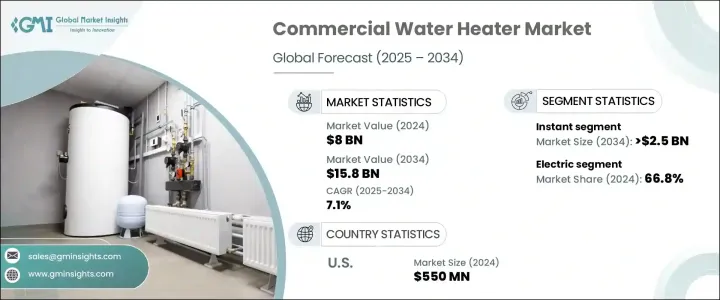
세계의 상업용 온수기 시장은 2024년 80억 달러에 달했고, 2025년부터 2034년까지 연평균 복합 성장률(CAGR) 7.1%를 나타낼 것으로 추정됩니다.
이 산업은 호스피탈리티, 헬스케어, 교육, 상업 부문의 기업이 에너지 효율이 높고 지속가능하며 기술적으로 고도의 급탕 솔루션을 점점 더 추구하고 있으며, 기세를 늘리고 있습니다. 탐소 배출량의 삭감을 중시하게 되어 현대의 요건을 충족하는 효율적인 온수 시스템에 대한 요구가 더욱 높아지고 있습니다.

또한 세계 각국의 정부는 고효율로 재생 가능 에너지가 통합된 온수 시스템의 채용을 지원하는 유리한 규제 틀과 인센티브를 도입하고 있습니다. 최종사용자의 에너지 사용과 업무효율의 최적화를 지원하고 있습니다.
| 시장 범위 | |
|---|---|
| 시작 연도 | 2024년 |
| 예측 연도 | 2025-2034년 |
| 시작 금액 | 80억 달러 |
| 예측 금액 | 158억 달러 |
| CAGR | 7.1% |
시장은 히터 유형, 에너지원, 디자인에 따라 세분화되어 폭넓은 상업용도에 대응하고 있습니다. 이 중 순간 온수기 부문은 괄목할 만한 성장세를 보이고 있으며 2034년까지 25억 달러의 매출을 올릴 것으로 예상됩니다. 컴팩트한 설계와 급속 가열 능력으로 알려진 순간 온수기는 사용 장소 근처에 설치할 수 있도록 설계되어 있어 대규모 배관의 필요성을 감소, 열손실을 최소화합니다. 공간 절약이기 때문에 호텔, 사무실, 레스토랑 등 한정된 공간밖에 없는 상업시설에 이상적인 솔루션이 되고 있습니다.
상업용 온수기 업계는 에너지원에 의해서도 분류되어 주로 전기 히터와 가스 히터로 나뉘어져 있습니다. 견고한 부품으로 설계되었으며, 지속가능성 목표가 조직에 깨끗한 대체 에너지를 요구하도록 하는 동안 전기 및 하이브리드 솔루션으로의 전환이 가속화되고 있습니다.
북미의 상업용 온수기 시장은 엄격한 에너지 효율 의무와 친환경 온수 시스템 설치를 장려하는 매력적인 정부 인센티브에 의해 지원되었으며, 2024년 5억 5,000만 달러와 13%의 점유율을 차지했습니다. LEED(에너지 및 환경 설계 리더십) 인증을 목표로 하는 상업용 건물이 늘어나면서 에너지 효율적인 온수기는 친환경 건물 표준을 달성하고 장기적인 에너지 비용을 절감하는 데 중요한 구성 요소로 자리 잡았습니다.
The Global Commercial Water Heater Market reached USD 8 billion in 2024 and is estimated to grow at a CAGR of 7.1% between 2025 and 2034. The industry is gaining momentum as businesses across hospitality, healthcare, education, and commercial sectors increasingly demand energy-efficient, sustainable, and technologically advanced water heating solutions. The rising emphasis on reducing carbon footprints, coupled with growing urbanization and infrastructural developments, is further fueling the need for efficient water heating systems that meet modern-day requirements. Heightened consumer awareness of energy consumption, cost savings, and environmental benefits associated with advanced water heaters is significantly shaping market trends.

Moreover, governments worldwide are introducing favorable regulatory frameworks and incentives that support the adoption of high-efficiency and renewable energy-integrated water heating systems. As the focus on smart technology integration grows, commercial water heaters equipped with IoT, remote monitoring, and automation features are also gaining considerable traction, helping end-users optimize energy use and operational efficiency. This increasing demand for intelligent and eco-friendly systems is opening new avenues for manufacturers to innovate and deliver solutions tailored to the evolving needs of commercial establishments.
| Market Scope | |
|---|---|
| Start Year | 2024 |
| Forecast Year | 2025-2034 |
| Start Value | $8 Billion |
| Forecast Value | $15.8 Billion |
| CAGR | 7.1% |
The market is segmented based on heater type, energy source, and design, catering to a broad range of commercial applications. Among these, the instant water heater segment is poised for remarkable growth and is projected to generate USD 2.5 billion by 2034. Instant water heaters, known for their compact design and rapid heating capability, are engineered to be installed close to points of use, reducing the need for extensive piping and minimizing heat loss. Their space-saving nature makes them an ideal solution for commercial buildings with limited space, such as hotels, offices, and restaurants. As commercial facilities prioritize energy efficiency and seek to lower operational costs, the demand for instant water heaters continues to rise, making them one of the fastest-growing categories in the market.
The commercial water heater industry is also classified by energy source, primarily into electric and gas heaters. Electric water heaters dominated the market with a 66.8% share in 2024, driven by their reliability, durability, and compatibility with emerging renewable energy sources like solar power. These units are designed with robust components to handle heavy-duty commercial usage while ensuring long-term performance. As sustainability goals push organizations to seek cleaner energy alternatives, the transition towards electric and hybrid solutions is accelerating. Manufacturers are focusing on innovating high-efficiency models that comply with tightening energy regulations, helping commercial entities meet stringent environmental and energy codes.
North America commercial water heater market accounted for USD 550 million and a 13% share in 2024, supported by strict energy efficiency mandates and attractive government incentives that encourage the installation of eco-friendly water heating systems. With more commercial properties aiming for LEED (Leadership in Energy and Environmental Design) certification, energy-efficient water heaters have become a critical component for achieving green building standards and reducing long-term energy costs.